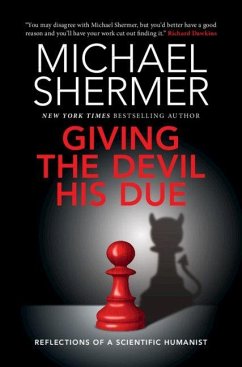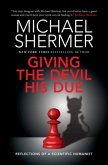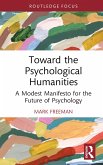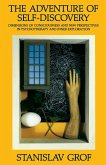Michael Shermer (California Chapman University)
Giving the Devil His Due
39,99 €
inkl. MwSt.
Versandkostenfrei*
Liefertermin unbestimmt
Melden Sie sich
hier
hier
für den Produktalarm an, um über die Verfügbarkeit des Produkts informiert zu werden.
oder sofort lesen als eBook

20 °P sammeln
Michael Shermer (California Chapman University)
Giving the Devil His Due
- Gebundenes Buch
This book is for all readers who care about science and reason, humanism and secularism, the progress of humanity, and the advancement of morals and values. It also advocates for the protection and continued expansion of human rights, such as civil rights, women's rights, LGBT+ rights, and animal rights.
Andere Kunden interessierten sich auch für
![Giving the Devil his Due Giving the Devil his Due]() Michael Shermer (California Chapman University)Giving the Devil his Due20,99 €
Michael Shermer (California Chapman University)Giving the Devil his Due20,99 €![The Art of Loving The Art of Loving]() Erich FrommThe Art of Loving8,99 €
Erich FrommThe Art of Loving8,99 €![The Farther Reaches of Human Nature The Farther Reaches of Human Nature]() Abraham H. MaslowThe Farther Reaches of Human Nature22,99 €
Abraham H. MaslowThe Farther Reaches of Human Nature22,99 €![Psychology in Minutes Psychology in Minutes]() Marcus WeeksPsychology in Minutes9,99 €
Marcus WeeksPsychology in Minutes9,99 €![Toward the Psychological Humanities Toward the Psychological Humanities]() Mark FreemanToward the Psychological Humanities55,99 €
Mark FreemanToward the Psychological Humanities55,99 €![Cultural Psychology and Acculturation Cultural Psychology and Acculturation]() Pawel Boski (SWPS University)Cultural Psychology and Acculturation21,99 €
Pawel Boski (SWPS University)Cultural Psychology and Acculturation21,99 €![The Adventure of Self-Discovery The Adventure of Self-Discovery]() Stanislav GrofThe Adventure of Self-Discovery33,99 €
Stanislav GrofThe Adventure of Self-Discovery33,99 €-
-
-
This book is for all readers who care about science and reason, humanism and secularism, the progress of humanity, and the advancement of morals and values. It also advocates for the protection and continued expansion of human rights, such as civil rights, women's rights, LGBT+ rights, and animal rights.
Hinweis: Dieser Artikel kann nur an eine deutsche Lieferadresse ausgeliefert werden.
Hinweis: Dieser Artikel kann nur an eine deutsche Lieferadresse ausgeliefert werden.
Produktdetails
- Produktdetails
- Verlag: Cambridge University Press
- Seitenzahl: 366
- Erscheinungstermin: 9. April 2020
- Englisch
- Abmessung: 236mm x 158mm x 32mm
- Gewicht: 656g
- ISBN-13: 9781108489782
- ISBN-10: 1108489788
- Artikelnr.: 58379326
- Herstellerkennzeichnung
- Libri GmbH
- Europaallee 1
- 36244 Bad Hersfeld
- gpsr@libri.de
- Verlag: Cambridge University Press
- Seitenzahl: 366
- Erscheinungstermin: 9. April 2020
- Englisch
- Abmessung: 236mm x 158mm x 32mm
- Gewicht: 656g
- ISBN-13: 9781108489782
- ISBN-10: 1108489788
- Artikelnr.: 58379326
- Herstellerkennzeichnung
- Libri GmbH
- Europaallee 1
- 36244 Bad Hersfeld
- gpsr@libri.de
Michael Shermer is Presidential Fellow at Chapman University, California, the Publisher of Skeptic magazine, and the host of the Science Salon podcast, and for eighteen years he was a monthly columnist for Scientific American. He is the author of a number of New York Times bestselling books including Heavens on Earth (2018), The Moral Arc (2015), The Believing Brain (2011), and Why People Believe Weird Things (2000). His two TED talks, viewed over nine million times, were voted into the top 100 out of more than 2,000 TED talks.
Introduction. Who is the Devil and what is he due?; Part I. The Advocatus Diaboli: Reflections on Free Thought and Free Speech: 1. Giving the Devil his due: why freedom of inquiry and speech in science and politics is inviolable; 2. Banning evil: in the shadow of the Christchurch massacre, myths about evil and hate speech are misleading; 3. Free speech even if it hurts: defending Holocaust denier David Irving; 4. Free to inquire: the evolution-creationism controversy as a test case in equal time and free speech; 5. Ben Stein's blunder: why intelligent design advocates are not free speech martyrs; 6. What went wrong? Campus unrest, viewpoint diversity, and freedom of speech; Part II. Homo Religiosus: Reflections on God and Religion: 7. E pluribus unum for all faiths and for none; 8. Atheism and liberty: raising consciousness for religious skepticism through political freedom; 9. The curious case of Scientology: is it a religion or a cult?; 10. Does the Universe have a purpose?; 11. Why is there something rather than nothing?; Part III. Deferred Dreams: Reflections on Politics and Society: 12. Another dream deferred: how identity politics, intersectionality theory, and tribal divisiveness are inverting Martin Luther King, Jr's dream; 13. Healing the bonds of affection: the case for classical liberalism; 14. Governing mars: lessons for the red planet from experiments in governing the blue planet; 15. The Sandy Hook effect: what we can and cannot do about gun violence; 16. On guns and tyranny; 17. Debating guns: what conservatives and liberals really differ on about guns (and everything else); 18. Another fatal conceit: the lesson from evolutionary economics is bottom-up self-organization, not top-down government design; Part IV. Scientia Humanitatis: Reflections on Scientific Humanism: 19. Scientific naturalism: a manifesto for Enlightenment humanism; 20. Mr Hume: tear. Down. This. Wall.; 21. Kardashev's types and Sparks' law: how to build civilization 1.0; 22. How lives turn out: genes, environment, and luck - what we can and cannot control; Part V. Transcendent Thinkers: Reflections on Controversial Intellectuals: 23. Transcendent man: an elegaic essay to Paul Kurtz - a skeptic's skeptic; 24. The real hitch: did Christopher Hitchens really keep two sets of books about his beliefs?; 25. The skeptic's chaplain: Richard Dawkins as a fountainhead of skepticism; 26. Have archetype - will travel: the Jordan Peterson phenomenon; 27. Romancing the past: Graham Hancock and the quest for a lost civilization.
Introduction. Who is the Devil and what is he due?; Part I. The Advocatus
Diaboli: Reflections on Free Thought and Free Speech: 1. Giving the Devil
his due: why freedom of inquiry and speech in science and politics is
inviolable; 2. Banning evil: in the shadow of the Christchurch massacre,
myths about evil and hate speech are misleading; 3. Free speech even if it
hurts: defending Holocaust denier David Irving; 4. Free to inquire: the
evolution-creationism controversy as a test case in equal time and free
speech; 5. Ben Stein's blunder: why intelligent design advocates are not
free speech martyrs; 6. What went wrong? Campus unrest, viewpoint
diversity, and freedom of speech; Part II. Homo Religiosus: Reflections on
God and Religion: 7. E pluribus unum for all faiths and for none; 8.
Atheism and liberty: raising consciousness for religious skepticism through
political freedom; 9. The curious case of Scientology: is it a religion or
a cult?; 10. Does the Universe have a purpose?; 11. Why is there something
rather than nothing?; Part III. Deferred Dreams: Reflections on Politics
and Society: 12. Another dream deferred: how identity politics,
intersectionality theory, and tribal divisiveness are inverting Martin
Luther King, Jr's dream; 13. Healing the bonds of affection: the case for
classical liberalism; 14. Governing mars: lessons for the red planet from
experiments in governing the blue planet; 15. The Sandy Hook effect: what
we can and cannot do about gun violence; 16. On guns and tyranny; 17.
Debating guns: what conservatives and liberals really differ on about guns
(and everything else); 18. Another fatal conceit: the lesson from
evolutionary economics is bottom-up self-organization, not top-down
government design; Part IV. Scientia Humanitatis: Reflections on Scientific
Humanism: 19. Scientific naturalism: a manifesto for Enlightenment
humanism; 20. Mr Hume: tear. Down. This. Wall.; 21. Kardashev's types and
Sparks' law: how to build civilization 1.0; 22. How lives turn out: genes,
environment, and luck - what we can and cannot control; Part V.
Transcendent Thinkers: Reflections on Controversial Intellectuals: 23.
Transcendent man: an elegaic essay to Paul Kurtz - a skeptic's skeptic; 24.
The real hitch: did Christopher Hitchens really keep two sets of books
about his beliefs?; 25. The skeptic's chaplain: Richard Dawkins as a
fountainhead of skepticism; 26. Have archetype - will travel: the Jordan
Peterson phenomenon; 27. Romancing the past: Graham Hancock and the quest
for a lost civilization.
Diaboli: Reflections on Free Thought and Free Speech: 1. Giving the Devil
his due: why freedom of inquiry and speech in science and politics is
inviolable; 2. Banning evil: in the shadow of the Christchurch massacre,
myths about evil and hate speech are misleading; 3. Free speech even if it
hurts: defending Holocaust denier David Irving; 4. Free to inquire: the
evolution-creationism controversy as a test case in equal time and free
speech; 5. Ben Stein's blunder: why intelligent design advocates are not
free speech martyrs; 6. What went wrong? Campus unrest, viewpoint
diversity, and freedom of speech; Part II. Homo Religiosus: Reflections on
God and Religion: 7. E pluribus unum for all faiths and for none; 8.
Atheism and liberty: raising consciousness for religious skepticism through
political freedom; 9. The curious case of Scientology: is it a religion or
a cult?; 10. Does the Universe have a purpose?; 11. Why is there something
rather than nothing?; Part III. Deferred Dreams: Reflections on Politics
and Society: 12. Another dream deferred: how identity politics,
intersectionality theory, and tribal divisiveness are inverting Martin
Luther King, Jr's dream; 13. Healing the bonds of affection: the case for
classical liberalism; 14. Governing mars: lessons for the red planet from
experiments in governing the blue planet; 15. The Sandy Hook effect: what
we can and cannot do about gun violence; 16. On guns and tyranny; 17.
Debating guns: what conservatives and liberals really differ on about guns
(and everything else); 18. Another fatal conceit: the lesson from
evolutionary economics is bottom-up self-organization, not top-down
government design; Part IV. Scientia Humanitatis: Reflections on Scientific
Humanism: 19. Scientific naturalism: a manifesto for Enlightenment
humanism; 20. Mr Hume: tear. Down. This. Wall.; 21. Kardashev's types and
Sparks' law: how to build civilization 1.0; 22. How lives turn out: genes,
environment, and luck - what we can and cannot control; Part V.
Transcendent Thinkers: Reflections on Controversial Intellectuals: 23.
Transcendent man: an elegaic essay to Paul Kurtz - a skeptic's skeptic; 24.
The real hitch: did Christopher Hitchens really keep two sets of books
about his beliefs?; 25. The skeptic's chaplain: Richard Dawkins as a
fountainhead of skepticism; 26. Have archetype - will travel: the Jordan
Peterson phenomenon; 27. Romancing the past: Graham Hancock and the quest
for a lost civilization.
Introduction. Who is the Devil and what is he due?; Part I. The Advocatus Diaboli: Reflections on Free Thought and Free Speech: 1. Giving the Devil his due: why freedom of inquiry and speech in science and politics is inviolable; 2. Banning evil: in the shadow of the Christchurch massacre, myths about evil and hate speech are misleading; 3. Free speech even if it hurts: defending Holocaust denier David Irving; 4. Free to inquire: the evolution-creationism controversy as a test case in equal time and free speech; 5. Ben Stein's blunder: why intelligent design advocates are not free speech martyrs; 6. What went wrong? Campus unrest, viewpoint diversity, and freedom of speech; Part II. Homo Religiosus: Reflections on God and Religion: 7. E pluribus unum for all faiths and for none; 8. Atheism and liberty: raising consciousness for religious skepticism through political freedom; 9. The curious case of Scientology: is it a religion or a cult?; 10. Does the Universe have a purpose?; 11. Why is there something rather than nothing?; Part III. Deferred Dreams: Reflections on Politics and Society: 12. Another dream deferred: how identity politics, intersectionality theory, and tribal divisiveness are inverting Martin Luther King, Jr's dream; 13. Healing the bonds of affection: the case for classical liberalism; 14. Governing mars: lessons for the red planet from experiments in governing the blue planet; 15. The Sandy Hook effect: what we can and cannot do about gun violence; 16. On guns and tyranny; 17. Debating guns: what conservatives and liberals really differ on about guns (and everything else); 18. Another fatal conceit: the lesson from evolutionary economics is bottom-up self-organization, not top-down government design; Part IV. Scientia Humanitatis: Reflections on Scientific Humanism: 19. Scientific naturalism: a manifesto for Enlightenment humanism; 20. Mr Hume: tear. Down. This. Wall.; 21. Kardashev's types and Sparks' law: how to build civilization 1.0; 22. How lives turn out: genes, environment, and luck - what we can and cannot control; Part V. Transcendent Thinkers: Reflections on Controversial Intellectuals: 23. Transcendent man: an elegaic essay to Paul Kurtz - a skeptic's skeptic; 24. The real hitch: did Christopher Hitchens really keep two sets of books about his beliefs?; 25. The skeptic's chaplain: Richard Dawkins as a fountainhead of skepticism; 26. Have archetype - will travel: the Jordan Peterson phenomenon; 27. Romancing the past: Graham Hancock and the quest for a lost civilization.
Introduction. Who is the Devil and what is he due?; Part I. The Advocatus
Diaboli: Reflections on Free Thought and Free Speech: 1. Giving the Devil
his due: why freedom of inquiry and speech in science and politics is
inviolable; 2. Banning evil: in the shadow of the Christchurch massacre,
myths about evil and hate speech are misleading; 3. Free speech even if it
hurts: defending Holocaust denier David Irving; 4. Free to inquire: the
evolution-creationism controversy as a test case in equal time and free
speech; 5. Ben Stein's blunder: why intelligent design advocates are not
free speech martyrs; 6. What went wrong? Campus unrest, viewpoint
diversity, and freedom of speech; Part II. Homo Religiosus: Reflections on
God and Religion: 7. E pluribus unum for all faiths and for none; 8.
Atheism and liberty: raising consciousness for religious skepticism through
political freedom; 9. The curious case of Scientology: is it a religion or
a cult?; 10. Does the Universe have a purpose?; 11. Why is there something
rather than nothing?; Part III. Deferred Dreams: Reflections on Politics
and Society: 12. Another dream deferred: how identity politics,
intersectionality theory, and tribal divisiveness are inverting Martin
Luther King, Jr's dream; 13. Healing the bonds of affection: the case for
classical liberalism; 14. Governing mars: lessons for the red planet from
experiments in governing the blue planet; 15. The Sandy Hook effect: what
we can and cannot do about gun violence; 16. On guns and tyranny; 17.
Debating guns: what conservatives and liberals really differ on about guns
(and everything else); 18. Another fatal conceit: the lesson from
evolutionary economics is bottom-up self-organization, not top-down
government design; Part IV. Scientia Humanitatis: Reflections on Scientific
Humanism: 19. Scientific naturalism: a manifesto for Enlightenment
humanism; 20. Mr Hume: tear. Down. This. Wall.; 21. Kardashev's types and
Sparks' law: how to build civilization 1.0; 22. How lives turn out: genes,
environment, and luck - what we can and cannot control; Part V.
Transcendent Thinkers: Reflections on Controversial Intellectuals: 23.
Transcendent man: an elegaic essay to Paul Kurtz - a skeptic's skeptic; 24.
The real hitch: did Christopher Hitchens really keep two sets of books
about his beliefs?; 25. The skeptic's chaplain: Richard Dawkins as a
fountainhead of skepticism; 26. Have archetype - will travel: the Jordan
Peterson phenomenon; 27. Romancing the past: Graham Hancock and the quest
for a lost civilization.
Diaboli: Reflections on Free Thought and Free Speech: 1. Giving the Devil
his due: why freedom of inquiry and speech in science and politics is
inviolable; 2. Banning evil: in the shadow of the Christchurch massacre,
myths about evil and hate speech are misleading; 3. Free speech even if it
hurts: defending Holocaust denier David Irving; 4. Free to inquire: the
evolution-creationism controversy as a test case in equal time and free
speech; 5. Ben Stein's blunder: why intelligent design advocates are not
free speech martyrs; 6. What went wrong? Campus unrest, viewpoint
diversity, and freedom of speech; Part II. Homo Religiosus: Reflections on
God and Religion: 7. E pluribus unum for all faiths and for none; 8.
Atheism and liberty: raising consciousness for religious skepticism through
political freedom; 9. The curious case of Scientology: is it a religion or
a cult?; 10. Does the Universe have a purpose?; 11. Why is there something
rather than nothing?; Part III. Deferred Dreams: Reflections on Politics
and Society: 12. Another dream deferred: how identity politics,
intersectionality theory, and tribal divisiveness are inverting Martin
Luther King, Jr's dream; 13. Healing the bonds of affection: the case for
classical liberalism; 14. Governing mars: lessons for the red planet from
experiments in governing the blue planet; 15. The Sandy Hook effect: what
we can and cannot do about gun violence; 16. On guns and tyranny; 17.
Debating guns: what conservatives and liberals really differ on about guns
(and everything else); 18. Another fatal conceit: the lesson from
evolutionary economics is bottom-up self-organization, not top-down
government design; Part IV. Scientia Humanitatis: Reflections on Scientific
Humanism: 19. Scientific naturalism: a manifesto for Enlightenment
humanism; 20. Mr Hume: tear. Down. This. Wall.; 21. Kardashev's types and
Sparks' law: how to build civilization 1.0; 22. How lives turn out: genes,
environment, and luck - what we can and cannot control; Part V.
Transcendent Thinkers: Reflections on Controversial Intellectuals: 23.
Transcendent man: an elegaic essay to Paul Kurtz - a skeptic's skeptic; 24.
The real hitch: did Christopher Hitchens really keep two sets of books
about his beliefs?; 25. The skeptic's chaplain: Richard Dawkins as a
fountainhead of skepticism; 26. Have archetype - will travel: the Jordan
Peterson phenomenon; 27. Romancing the past: Graham Hancock and the quest
for a lost civilization.
'Michael Shermer is our most fearless explorer of alternative, crackpot, and dangerous ideas, and at the same time one of our most powerful voices for science, sanity, and humane values. In this engrossing collection, Shermer shows why these missions are consistent: it's the searchlight of reason that best exposes errors and evil.' Steven Pinker, Johnstone Professor of Psychology, Harvard University, and author of Enlightenment Now: The Case for Reason, Science, Humanism, and Progress








